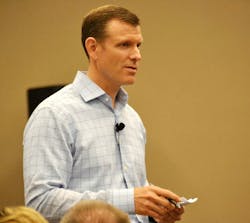With National Truck Driver Appreciation Week kicking off Sunday—and with a notebook full of items to catch up on—I thought this would be a good time to get behind the wheel, empathetically speaking, to sort my notes based on a simple measure: Good for drivers, or not?
(And, to reinforce my pro-driver bias, I’m writing this up while stuck on I-30 West outside of Little Rock, where accidents have turned a quick delivery—a new fridge for my father’s RV 30 miles away—into 2-hour delays on the freeway; miraculously, both ways. This began in late afternoon, and I thought I’d allowed plenty of time to make it there and back before dark. So as the sky darkens and my Dad-dispatcher is getting impatient, I’m more than a little peeved, pardon my French—until I get out to chat with the real professionals … whose HOS clocks are ticking, whose delivery windows are closing, whose parking spaces are being filled.)
The good news from the Great American Trucking Show in Dallas is that drivers were the focus of attention for many of the industry suppliers on hand. But selling to drivers is one thing; are the products and services really something that drivers need?
Anyway, a quick flip though my notes from recent GATS turned up three visits that fit the bill in different ways.
Driver as customer: ‘Small things matter’
Pilot Flying J hosted a lunch session for drivers, both to update customers on new offerings such as free and improved Wi-Fi and the new “cardless fueling” feature of the myPilot app, and to get feedback on what the nation’s largest truck stop chain is doing right—and not so right.
Knowing that drivers wouldn’t be shy about sharing their thoughts—the good and the bad—I was pleasantly surprised when the folks from PFJ said I’d be welcomed to sit in. Impressively, the town hall was led by a couple of guys who could get things done: Jason Nordin, senior vice president of operations, and David Hughes, vp of sales and transportation.
Indeed, after earlier hearing on the show floor a driver’s concern about safety at a Dallas-area location, Nordin had just returned from a site visit. And he and Hughes both were literally taking down names of stores where drivers reported problems and delegating responsibility for fixing the problems to other PFJ personnel in the room. Nordin also assured the drivers at the lunch meeting that they should never hesitate to report problems or concerns to the company.
“Please, just give us a call,” he said, frequently.
Among the issues brought up at the GATS session, drivers pointed to the need for more pet areas and secure walking paths. They also questioned the need for video game rooms when exercise areas would serve drivers better. Parking—and better managing RV and four-wheeler use of the truck lots—took up a good portion of the hour-and-a-half discussion. Drivers also emphasized the importance of generous loyalty programs and of maintaining sufficient staff at all locations.
“The small things matter,” Nordin said after the meeting. "As we develop new products and services at Pilot Flying J, it is important to listen to feedback we receive from professional drivers. Hosting our first town hall at this year's GATS is a great way to engage with drivers in an environment that truly focuses on them and the work they do. What we learn here will allow us to continually improve our guest experience.”
Driver as partner: ‘Respect is coin’
I also checked in with Barry Conlon as to the status of Overhaul, his startup that aims to connect top-tier owner-ops with “premium-level” shippers, cutting out brokers and cutting drivers in for a bigger piece of the freight bill.
Essentially, Conlon is leveraging his connections in the industry—he founded the logistics security firm FreightWatch International—to sell shippers on the notion that they can have better service and some cost savings through Overhaul. Overhaul, through a performance-based system, will also pay drivers more—and much more quickly—because it takes just a fraction what established brokers do.
“A lot of these startups haven’t really figured it out—they’re Harvard grads with an app,” Conlon said. “I knew what the trucking industry needed. Shippers have a soul, they’re just guilty through apathy. They’re not aware of how badly the system is run when it comes to how the driver is treated.”
The marketplace is set to go online Sept. 16, and Overhaul has already been moving loads for a couple of high-value freight customers with about 200 owner-ops on board.
“The driver is just looking for his fair share, but he’s the last guy anyone thinks about in the ecosystem,” Conlon said. “They’re proven entrepreneurs. We’re trying to make that guy successful. Driver’s don’t get a lot of respect out there, but respect is coin.”
Driver as data point: Providing a voice
Speaking of startups, I also ran into Max Farrell, co-founder and CEO of Workhound, a driver retention tool for fleets. The app is straightforward: It simply asks how the driver feels about work that day, on a scale of 1 to 10. Along with collecting that quantitative data point, the driver may then explain at a subsequent screen, "Why?". The object is to get the driver in and out in 60 seconds—and to give the fleet feedback regarding driver issues, through Workhound’s analytics packages.
“You get the pulse of what drivers are talking about,” Farrell says.
At GATS, he hinted that WorkHound would soon be announcing its newest—and largest—fleet, and that comes after what’s been a busy summer. Farrell was invited to participate in President Obama’s Global Entrepreneurship Summit in June, one of 100 U.S. representatives. And Workhound was one of 10 teams selected for the logistics-focused Dynamo Accelerator in Chattanooga, TN. The three month innovation program started in July.
What’s that got to do with driver appreciation, other than WorkHound’s mission of “helping people love the work they do”?
“We’ve grown to provide thousands of drivers a voice with trucking companies across the country, helping them make significant improvements,” Farrell explains. “Carriers have changed load planning procedures, retained drivers that were hours away from quitting, and drivers have had their pay issues resolved.”
About the Author
Kevin Jones
Editor
Kevin has served as editor-in-chief of Trailer/Body Builders magazine since 2017—just the third editor in the magazine’s 60 years. He is also editorial director for Endeavor Business Media’s Commercial Vehicle group, which includes FleetOwner, Bulk Transporter, Refrigerated Transporter, American Trucker, and Fleet Maintenance magazines and websites.
Working from Beaufort, S.C., Kevin has covered trucking and manufacturing for nearly 20 years. His writing and commentary about the trucking industry and, previously, business and government, has been recognized with numerous state, regional, and national journalism awards.


